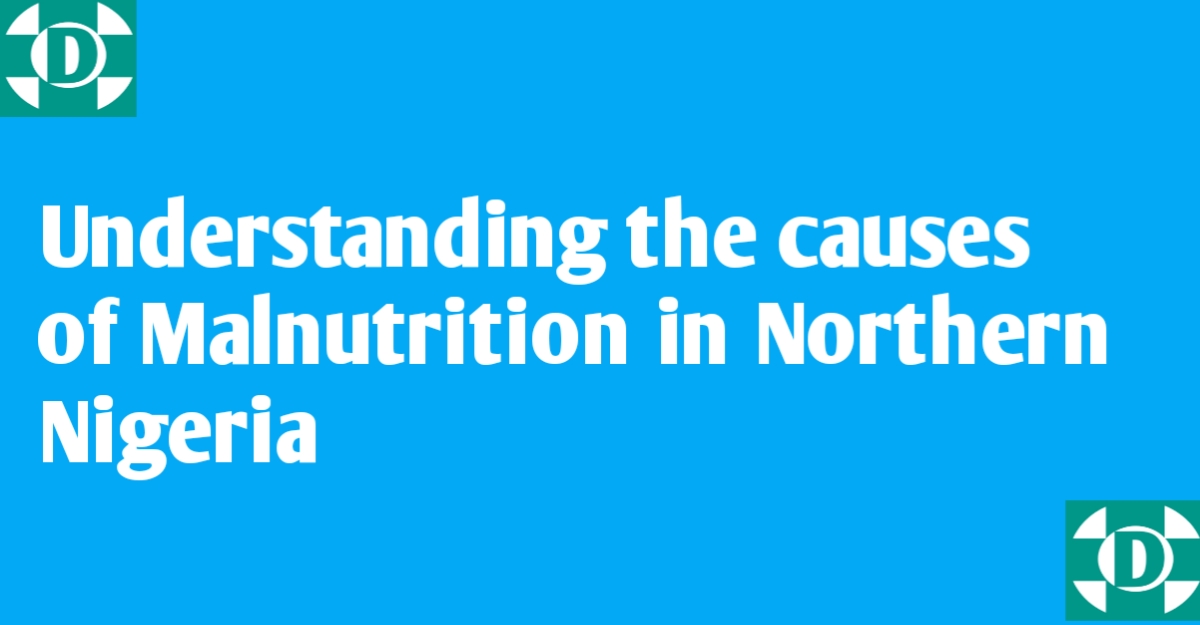Understanding the causes of Malnutrition in Northern Nigeria

malnutrition in northern Nigeria
To clear up any disturbances affecting the community, we must understand their causes. By understanding the situation and what causes it, we can be able to clear up the challenges. In Nigeria, people are facing challenges from malnutrition, especially children and older adults in the northern part of the country. This results in death, weak immune systems, social disturbances and mental problems.
To help a community restore well and move out of this deadly condition, the following has to be done: I have done research and found out that if we want to clear away malnutrition, especially in the northern part of Nigeria, we need to understand what malnutrition is, its causes in our community and the roles of government, non-governmental organizations, community leaders and well-to-do members of a society.
What is malnutrition?
Malnutrition occurs when a person is unable to get the adequate food that his body needs to function. This can be seen in the person’s appearance becoming thin, weight lost and being easily infected with illness as a result of a weakening body’s immune system.
This definition explains the real and obvious meaning of malnutrition, which everyone who can read and understand English can understand. In northern Nigeria, many people have malnutrition, including women and children. Malnutrition can either be undernutrition, which largely affects people, or micronutrient deficiency. Let’s see those two types.
Read also: How to join Doctors Without Borders as a nurse or a doctor
Types of malnutrition.
- Undernutrition
- Micronutrient deficiency
Undernutrition
This type of malnutrition affects people the most, as it happens to people who are unable to get adequate calories and proteins. This results in malnutrition, called undernutrition.
Micronutrient deficiency
When a person doesn’t have enough or is not taking enough vitamins and minerals, it results in micronutrient deficiency and malnutrition. This type is less common in the northern part of Nigeria.
Malnutrition in Northern Nigeria
By understanding the above definition and type of malnutrition, you can know the type of malnutrition and what causes it. I have already said that undernutrition is the most common type of malnutrition in northern Nigeria, which results from inadequate food in the region. Let’s see what northern Nigeria was like before.
Read also: How to work for a humanitarian organization
Peace and Northern Nigeria
In terms of food, business, education and rearing animals, northern Nigeria was known as the origin of farming, marketing and rearing of cattle, sheep, goats, and chickens. Most of the people relied on those sources as their sources of income. Many farmers produce a large amount of food that they can consume for more than 2 to 3 years, even if they do not farm again. They rear cattle and sheep.
If in the market some farmers grow crops to sell and get money to satisfy their needs, things are in good condition for them with only farming and rearing animals. People then were in a peaceful environment to study and get quality education.
Education was cheap then, and many people were able to attend school, including adults and children. The only things that hindered schools then were culture and the level of religious knowledge, not poverty and insecurity.
Peace disruption in Northern Nigeria
When the changes in the state of stability begin to set in, the northern part of Nigeria starts facing challenges with peace, the education system, business, farming activities and rearing animals. All the people’s sources of income in the northern part of Nigeria were affected by the peace farming activity, which drastically deteriorated, resulting in an inability to farm food to eat. Education and marketing systems were affected, resulting in more poverty and illiteracy. Mental wellbeing was affected, and now most of the people in the northern part of Nigeria are not able to feed themselves or their families. People are displaced.
Read also: United Kingdom Nurse Salary Per Month and Understanding Pay scale – 2024
Causes of Malnutrition in northern Nigeria
- Conflict and displacement
- Mental health condition
- Poverty
- Lack of knowledge about nutrition
- Chronic disease
- Limited access to clean water
- Poor sanitation
- Substance abuse
The above are the causes of malnutrition in the northern part of Nigeria; let us discuss them one after the other.
Conflict and displacement
Most of the people affected by the malnutrition caused by the conflict and displacement are from the following states:
- Borno state
- Zamfara state
- Katsina state
- Sokoto state
- Kano state
- Bauchi state
- Jigawa state
- Kebbi state
The people from those states have been affected by conflicts and disasters. As a result, many were displaced and unable to get access to a balanced diet and clean water for healthy growth and development. People from these areas cannot farm or rear animals.
Read also: LASSA Fever Outbreak in Nigeria Guide to Stay safe NCDC, NMA
Poverty
With increased conflict, poverty increases as farming and marketing systems are disrupted. Increased poverty in northern Nigeria is not a new thing; most people are facing poverty challenges on a daily basis.
Poverty deprived people of adequate nutrition, as they could not afford to buy enough food or were unable to get food rich in nutrients.
Mental health condition
Conflict and poverty result in altered mental health status for individuals; this can lead to stress, anxiety and even depression. People with this kind of condition cannot eat adequate food or even absorb the nutrients needed.
Lack of knowledge about nutrition
In northern Nigeria, few people have enough food but don’t know how to choose the right food or prepare it to preserve nutrients and get the required balanced diet. This contributes to malnutrition among the people in the northern Nigeria.
Chronic disease
Chronic diseases such as HIV/AIDS, tuberculosis and cancer affect nutrient absorption from food, most affected people are at high risk of being affected by malnutrition.
Limited access to clean water
In northern Nigeria, most people are getting drinking water from Gebe, Korama, Gulbi etc all those mentioned sources of water are not clean. While clean water is essential for growth and good health, people who don’t have access to clean water are more likely to be affected by malnutrition.
Poor sanitation
With poor sanitation, people are at risk of infection. Most displaced people are living in an area with poor hygiene and are mostly living in a very crowded environment. Infection makes it difficult for people to absorb the nutrients they need from food.
Substance abuse
Many people lost their loved ones, family, friends, neighbors and some important people in the community. Now most of them think they are no longer important and thinking of taking alcohol, drugs, and other substances is a way to relieve their anxiety. Not knowing that they are affecting their health. Because those substances prevent the body from absorbing the required nutrients,.
The impact of Malnutrition
Malnutrition can have a serious impact on a person’s health, and it can lead to a number of complications, including:
- Stunted growth and development in children
- Weak immune system
- Increased risk of infection
- Muscle wasting
- Organ failure
- Death
Some important solutions to this problem
- Health education and promotion in the community.
- Programs that support healthy nutrition.
- Empowerment and job opportunities.
- Addressing security issues in the region.
- Enhancing agricultural activity in the region.
Conclusion
This article is about the causes of malnutrition in Nigeria, especially in the northern part of the country. We now understand what malnutrition is, it’s causes and how it affects people in this region.


